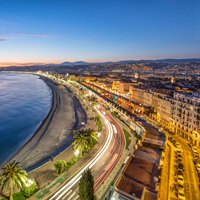Retire in Bordeaux Guide
Summary: Retire in Bordeaux with confidence, armed with the knowledge from our extensive guide. It covers critical considerations for retirees, from the cost of living and climate to housing, healthcare, and residency choices in Bordeaux. We also delve into the social and cultural scene, volunteering options, public transportation facilities, and the city's walkability, helping you make an informed decision.
Bordeaux is a popular retirement destination for international retirees due to its rich history, vibrant culture, and world-renowned wine industry. The city offers a high quality of life, with a range of amenities and activities to suit all tastes. However, like any major city, it also presents certain challenges, such as the cost of living and the need to learn a new language.
Living Expenses in Bordeaux
The cost of living in Bordeaux is relatively high compared to other French cities, but it is still more affordable than many other European destinations. Housing is the biggest expense, with the average rent for a one-bedroom apartment in the city center being around €700 per month. However, groceries, utilities, and healthcare are reasonably priced. Eating out can be expensive, but there are plenty of affordable options if you know where to look.
Bordeaux's Climate
Bordeaux has a temperate oceanic climate, with mild winters and warm summers. The city gets plenty of sunshine throughout the year, making it an ideal place for outdoor activities. However, it also gets a fair amount of rain, particularly in the winter months, so it's a good idea to have an umbrella handy.
Healthcare Facilities
Bordeaux is home to several top-rated hospitals and clinics, including the University Hospital of Bordeaux and the Polyclinic Bordeaux Nord Aquitaine. The city also has a large number of general practitioners and specialists, ensuring that retirees have access to high-quality healthcare.
Public Healthcare System
France has one of the best public healthcare systems in the world, and international retirees can enroll in it after living in the country for three months. However, many retirees also choose to have private health insurance to cover any additional costs.
Residency Options
France offers several types of visas for international retirees, including the long-stay visa, which allows you to live in the country for up to a year, and the retiree visa, which is specifically designed for retirees. Both visas require proof of financial self-sufficiency and health insurance.
Recreational Activities
Bordeaux has a wealth of parks and recreational facilities, including the beautiful Public Garden and the Bordeaux Botanical Garden. The city is also home to several golf courses and tennis clubs, as well as a network of cycling paths.
Local Cuisine
Bordeaux has a vibrant food scene, with a range of restaurants to suit all budgets. Some popular options include Le Petit Commerce, a seafood restaurant in the city center, and La Tupina, a traditional French restaurant known for its regional dishes.
Language Learning Opportunities
Learning French is essential for living in Bordeaux, and there are several language schools in the city that offer courses for beginners. The Alliance Française de Bordeaux is a popular choice, offering a range of classes and cultural activities.
Local Culture
The people of Bordeaux are known for their friendliness and hospitality. The city has a relaxed, laid-back vibe, and locals enjoy a slower pace of life. The weekly market at the Place des Quinconces is a great place to meet locals and experience the city's vibrant culture.
Volunteer Opportunities
There are several organizations in Bordeaux that welcome volunteers, including the Bordeaux Red Cross and the local food bank. Volunteering is a great way to meet people and give back to the community.
Housing Options
Most retirees in Bordeaux live in apartments in the city center, which offer easy access to amenities and public transportation. However, there are also plenty of houses available in the suburbs for those who prefer a quieter lifestyle.
Transportation
Bordeaux has an excellent public transportation system, with a network of trams, buses, and bikes. The city is also very walkable, with most amenities within easy reach. However, having a car can be useful for exploring the surrounding countryside.
About the Author
 Betsy Burlingame is the Founder and President of Expat Exchange and is one of the Founders of Digital Nomad Exchange. She launched Expat Exchange in 1997 as her Master's thesis project at NYU. Prior to Expat Exchange, Betsy worked at AT&T in International
and Mass Market Marketing. She graduated from Ohio Wesleyan University
with a BA in International Business and German.
Betsy Burlingame is the Founder and President of Expat Exchange and is one of the Founders of Digital Nomad Exchange. She launched Expat Exchange in 1997 as her Master's thesis project at NYU. Prior to Expat Exchange, Betsy worked at AT&T in International
and Mass Market Marketing. She graduated from Ohio Wesleyan University
with a BA in International Business and German.
Some of Betsy's articles include 12 Best Places to Live in Portugal, 7 Best Places to Live in Panama and 12 Things to Know Before Moving to the Dominican Republic. Betsy loves to travel and spend time with her family. Connect with Betsy on LinkedIn.




